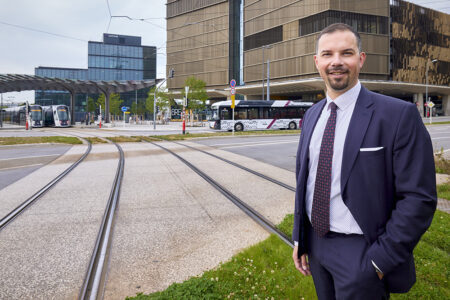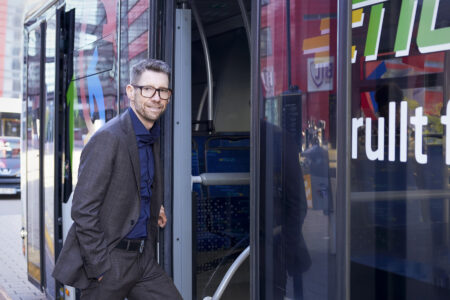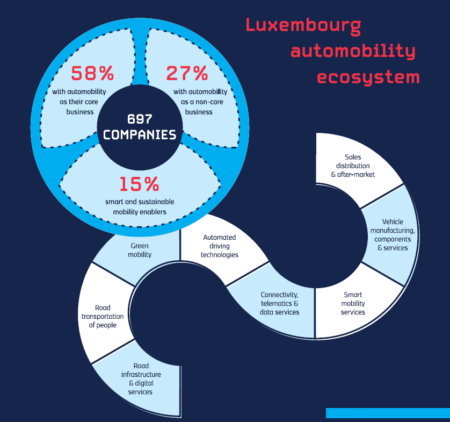 The ability to move freely from one place to another – and at an affordable price – is essential. However, this everyday activity is often fraught with difficulties: endless queues on the motorway, buses that do not arrive on time, difficulties to find parking, pollution, noise… As a booming regional economic hotspot with a fast-growing population, over 200,000 cross-border workers and the concentrated activities of a lively logistics hub, Luxembourg faces various challenges with regards to mobility issues.
The ability to move freely from one place to another – and at an affordable price – is essential. However, this everyday activity is often fraught with difficulties: endless queues on the motorway, buses that do not arrive on time, difficulties to find parking, pollution, noise… As a booming regional economic hotspot with a fast-growing population, over 200,000 cross-border workers and the concentrated activities of a lively logistics hub, Luxembourg faces various challenges with regards to mobility issues.
There is a strong interest in Luxembourg in integrating new mobility solutions.
“We are very conscious of the role and importance of mobility in daily work and life,” confirms Jean Schiltz, Head of Smart Mobility at the Ministry of the Economy. “There is a strong interest in Luxembourg in integrating new mobility solutions. Because of the special situation that we are facing, everyone is concerned by the topic and different stakeholders are willing to work together.”
Unique mobility mix
 In order to free up road capacity and offer sustainable transport alternatives, the country is investing extensively in public transport, notably rail infrastructure and decarbonised bus fleets, and in facilitating multimodality. Luxembourg also made the international headlines in 2020 when it became the first country in the world to make all public transport free of charge. However, many Europeans live outside dense urban areas, or have other constraints that make the use of privately owned cars unavoidable.
In order to free up road capacity and offer sustainable transport alternatives, the country is investing extensively in public transport, notably rail infrastructure and decarbonised bus fleets, and in facilitating multimodality. Luxembourg also made the international headlines in 2020 when it became the first country in the world to make all public transport free of charge. However, many Europeans live outside dense urban areas, or have other constraints that make the use of privately owned cars unavoidable.
What makes Luxembourg special is that we do not ignore the advantages of car ownership and usage. Instead, we facilitate a smart mobility hybrid mode.
“Our focus is on developing an integrated travel experience from first to last mile, but our approach is quite unique,” underlines Joost Ortjens, Head of International Business Development – Smart Mobility at national innovation agency Luxinnovation. “Many regions are trying to replace car ownership by ‘mobility as a service’ solutions. What makes Luxembourg special is that we do not ignore the advantages of car ownership and usage. Instead, we facilitate a smart mobility hybrid model that allows people to combine their cars with public transportation and other mobility services. Building modern and safe car parks next to mobility hubs is one way of encouraging people to take the train or bus for part of the journey rather than driving all the way. Though it might seem simple, this way of addressing mobility challenges is not very common.”
Nation-wide smart mobility app
Data is also an important component. Luxembourg already has a nation-wide smart mobility app that calculates the optimal way to travel between two destinations, including both public transport and car and bike sharing. “We are working to digitalise the transport sector further, benefitting from Luxembourg’s outstanding digital infrastructure: world-class connectivity, a business-oriented high performance computer, the national GAIA-X hub that is involved in the European endeavour to harmonise data exchange, and our forthcoming data exchange platform and national cloud,” says Mr Schiltz.
Partnerships for mobility innovation
These initiatives make Luxembourg a fertile ground for mobility innovation with a wide array of partnership opportunities. The University of Luxembourg’s Interdisciplinary Centre for Security, Reliability and Trust (SnT) has high-level expertise in the fields of autonomous mobility, robotics and drone technology, and its MobiLab specialises in traffic planning and modelling. The Luxembourg Institute of Science and Technology (LIST) specialises in digital twins and traffic simulations, and the Luxembourg Institute of Socio-Economic Research (LISER) focuses on urban development and mobility.
If such a pilot project is conclusive and validated by a prospective customer in Luxembourg, it could be used to sell the solution all over Europe.
“There are often open mobility innovation opportunities provided by public stakeholders. The national railway company CFL, for example, is eager to test and validate next generation mobility solutions,” says Mr Ortjens. “In the private sector, Amazon Europe is headquartered in Luxembourg and pushing innovation in middle and last-mile deliveries. My advice to smart mobility businesses interested in the European market is always to try to find a partner to test their technology and solution in a real-life situation. If such a pilot project is conclusive and validated by a prospective customer in Luxembourg, it could be used to sell the solution all over Europe.”
Towards zero emission
 The need to become smart and digital is not the only challenge that the mobility sector faces today. “Factors such as increasing raw material and energy prices, the shortage of essential components like microchips and a volatile level of orders are putting the automotive industry under pressure,” explains Anthony Auert, Luxembourg AutoMobility Cluster Manager at Luxinnovation. “The EU’s recent decision that all new cars sold from 2035 onwards should be zero emission also calls for a major technological change with far-reaching impact on supply chains and production lines. But, as it is the case in all critical situations, this also opens new avenues for innovation.”
The need to become smart and digital is not the only challenge that the mobility sector faces today. “Factors such as increasing raw material and energy prices, the shortage of essential components like microchips and a volatile level of orders are putting the automotive industry under pressure,” explains Anthony Auert, Luxembourg AutoMobility Cluster Manager at Luxinnovation. “The EU’s recent decision that all new cars sold from 2035 onwards should be zero emission also calls for a major technological change with far-reaching impact on supply chains and production lines. But, as it is the case in all critical situations, this also opens new avenues for innovation.”
This is clearly reflected in the Luxembourg ecosystem. “At the Ministry of the Economy, we are pleased to see the number of projects that are being presented to us by national entities as well as international organisations interested in opening offices here,” says Mr Schiltz. “They often focus on powertrain development and applications for new electric vehicles, as well as on advancing fuel cell, biofuel or e-fuel vehicles. The sector is in full transition, and we can see that Luxembourg companies are doing their utmost to fit in, notably by investing in electrification and zero-emission vehicles.”
Catalysts for change
For decades, Luxembourg has been home to globally operating automotive component suppliers such as Goodyear, IEE, Carlex (recently acquired by Webasto), BorgWarner (formerly Delphi) and Cebi International. They are surrounded by a dynamic ecosystem of around 700 companies – including some 50 start-ups – that have automobility as their main or secondary activity. Some 100 of them are service providers supporting the emergence of more intelligent and sustainable mobility. “These innovative businesses have a key role to play, and companies here have access to more than 100 local change catalysts that can support their transformation,” comments Mr Auert.
When I ask them why they remain committed to this location, they always talk primarily about the access to talent within Luxembourg’s highly qualified, multicultural population.
He emphasises the constant reinvestments made in Luxembourg by companies such as Goodyear, which recently inaugurated its fully automated top-of-the-range production facilities in the south of the country. “When I ask them why they remain committed to this location, they always talk primarily about the access to talent within Luxembourg’s highly qualified, multicultural population. They also mention the country’s central location in Europe and neutral image which facilitates contacts with clients in different European countries, as well as the accessibility to high-level decision makers and their business oriented approach. They recognise that the country does everything to support entrepreneurs and the national economy, and this is highly appreciated.”
Photos: © Luxinnovation/Eric Devillet

